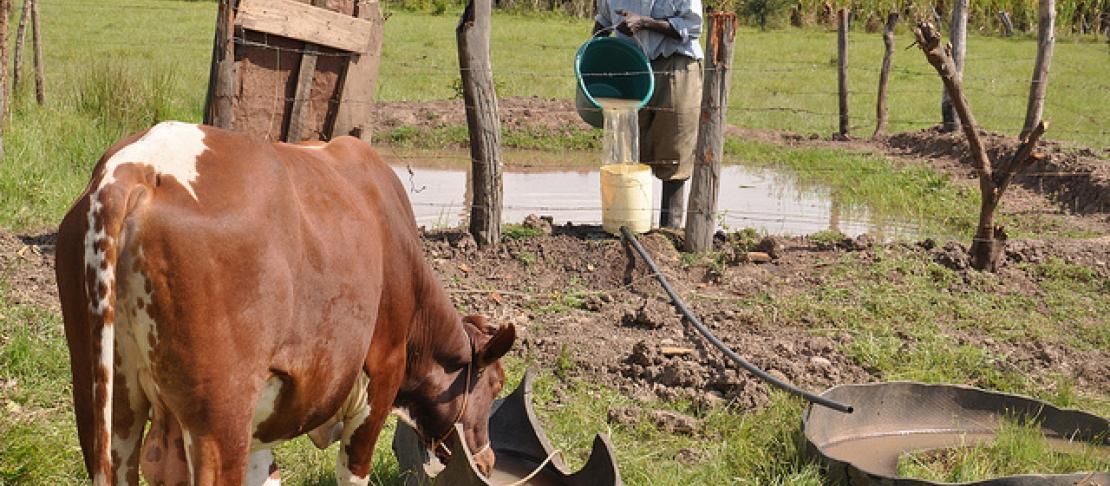From index insurance to commercial partnerships: what livestock farming looks like in modern Africa

Why is livestock crucial?
At the household level, agriculture plays a major role in the livelihood security for the majority of the East African population. At the national level, all these households add up to make one, big impact.
“In Africa, livestock is responsible for 40% of the agricultural Gross Domestic Product”, explained ShirleyTarawali, Director of Institutional Planning at the International Livestock Research Institute (ILRI).
Agriculture is responsible for a large portion of many East African countries' national GDP: 23.4 percent in Uganda, 28.8 percent in Kenya, 27.7 percent in Tanzania and 46.4 percent in Ethiopia, show figures from the World Bank.
At both ends of the spectrum, from smallholder farmers to national GDPs, climate risk threatens to undermine the agricultural sector and the security it brings.
And that security does not limit itself to the economic sphere, as the demand for livestock products keeps growing.
“In Kenya, for example, 80 percent of the meat consumed is produced in the drylands”, said Polly Ericksen, a researcher at ILRI.
The challenge then becomes how to respond to the growing demand for livestock products in the face of ever-changing and erratic rainfall patterns. While also addressing efficiency to reduce the GHG emissions produced per unit.
“Complex systems require innovative solutions from research and development”, continued Polly.
Both Shirley and Polly were speaking at special side-event to the 6th Africa Agriculture Science Week (AASW6) that explored the role of livestock research for food security and poverty reduction in Africa.
Read what we are doing on GHG emissions: Improving science in Africa key to implementing mitigation strategies for livestock
As one of the key players in the drylands CGIAR Research Programme, ILRI has piloted Index Based Livestock Insurance (IBLI) in Northern Kenya and in Ethiopia. This exciting innovation ensures that vulnerable rural smallholder farmers and livestock keepers are protected from climate-related risk through specialized insurance schemes.
Livestock insurance in commercial systems
Is there a long-term role for livestock insurance in commercial pastoral production systems?
“Livestock insurance is an investment choice. There are risks involved and stakeholders ought to consider issues such as premiums that might be too high for smallholder farmers. This may limit adoption”, said Michael Oku.
It was agreed that partnerships with the private sector could help address some of the problems with livestock insurance.
“Currently, the private sector is being led into the sector but not necessarily leading. They need to be at the forefront with researchers providing insight, ” remarked Iddo Dror of ILRI.
Feed and water for growth
During the discussions, it was agreed that commercial livestock production could lead to growth in risk-prone areas. This would, however, only be achievable if the problems of feed and water are solved.
Learn more: Rangeland enclosures could help pastoralists cope with climate variability
In Kenya, the CGIAR research program on climate change, agriculture and food security (CCAFS) together with our partners, are conducting action research to help build resilience among smallholder farmers. This entails the introduction of improved small livestock such as goats, sheep and poultry that will help these farmers diversify their livelihoods.
To solve the feed crisis, these farmers and researchers are establishing improved access to fodder through demonstration plots by youth groups. Desmodium and nappier grass are some of the fodder crops being grown to meet the feed crisis.
To solve the water crisis, farmers are establishing water pans that can hold approximately 500 m3 of rainwater. Such water is used both for irrigation purposes and for watering livestock and can lasts up to 3 months into the dry season.
Read more: East Africa: Battling Climate Change with diversity
Learn more: Water in a changing climate: can we do more with less?
Vivian Atakos is a Communications Officer for the CCAFS East Africa regional office. CCAFS is currently at the Africa Agriculture Science Week in Accra, Ghana.
Follow us live from the Africa Agriculture Science Week (#AASW6) on our blog and Twitter.



